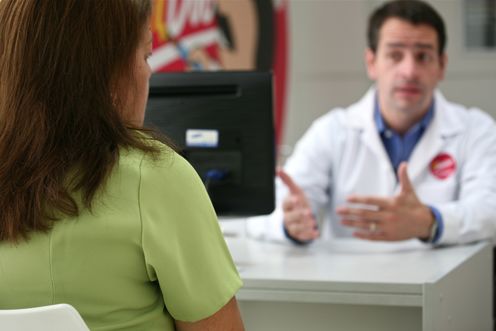
Australia spent $16 billion on GP-related health care in 2012-13. That’s about $690 for each person. Given that our public health system means each of us is paying for health care through our taxes, what should we expect from our doctors?
Generally, Australians expect ready access to a general practitioner when they’re ill, and they want a GP who will listen carefully to what they say. But there are many other services you should expect.
These include: dealing with ongoing problems; anticipating and preventing diseases you’re at risk of developing; promoting good health generally and providing appropriate health education to this end; helping you get the most out of all health-care professions when you’re ill; doing house calls when necessary; being compassionate and knowledgeable about the process of death and dying; and generally being your health advocate.
Empowering patients
One measure of a good GP is when she takes two minutes to diagnose your sore throat and then says, “Good, we now have ten minutes of the consultation left to examine you for skin cancers, review your asthma and answer any questions you have about your health.”
This preventive medicine approach aims to stop or detect the earliest evidence of disease and deal with it. At the very least, your GP should ensure that you know your blood group, blood pressure and cholesterol levels, and your family’s history of important disorders, such as heart attacks, diabetes, aortic aneurysm, glaucoma and certain types of cancers. Being aware of these risks means you’re likely to detect abnormalities earlier and get them treated.
Your GP should also teach you how to get the best from the health system. This includes knowing when you shouldn’t bother seeing a doctor. You should probably avoid your local GP when you have a cold, for instance, but not put off a consultation for new, severe symptoms until Friday evening.
The former will just help spread the virus causing the cold throughout your doctor’s waiting room. The latter will result in referral to a hospital emergency department since the necessary community-based investigative facilities will be closed.
At some stage, you’re going to be too ill or too infectious to get to your local doctor’s surgery. You should expect that your GP will make a house call when that happens.
House visits are time-consuming and uneconomic for doctors. But they’re useful because they give her unique insights into your interpersonal relationships, financial circumstances and lifestyle. These insights will give her a better view of how you’re really coping.
That extra little bit
You never know when you’ll get really unwell out of the usual surgery hours. So your GP should ensure you know what sort of medical help is available to you and how to access it.

She should have good records that contain a summary of your current and pertinent past problems. Until the personally controlled electronic health record (PCEHR) system is working, you should have several copies of this summary. You can take it to any after-hours medical service you visit, or use it when you’re travelling. It will save you a lot of time, medical investigation and money.
A common cause for a patient suing her doctor is for her failure to diagnose a serious condition. But patients who go from doctor to doctor so that no single health professional ever has the opportunity of seeing their changing symptoms and signs put themselves in diagnostic jeopardy.
Medicare provides for the preparation of various health management plans. Used properly by a patient’s regular GP, they’re useful. But beware of other practices, which you don’t regularly visit, that want to maximise their income by doing a health management plan for you.
Finally, your GP should be your health advocate. The modern health system is complex and patients can get lost in it. They can also get lost on hospital waiting lists. The advocacy of your GP can often work a bureaucratic miracle.
Endangering the species
Sounds positively utopian, doesn’t it? But the problem is you. The major impediment to realising this ideal of good general practice is that few patients understand the task of general practice and the part that GPs could and should play in their health care.
Indeed, many health-care consumers place convenience above quality. They attend any clinic where “there’s no waiting, they give you what you want and you don’t have to pay”.
But these same patients go and see their old family doctor when they’re really sick or worried. Sadly, they seem unaware that their consulting behaviour renders their family GP a financially endangered species.
Now that you know what you should expect, I hope you will become a more discerning and demanding consumer of health care, who expects more from your GP than quick, bulk-billed, episodic care for a series of acute illnesses.
If you expect a lot, a lot is what you may get. It may mean that your local parliamentary member starts listening to your expectations, and the federal government stops destroying quality general practice.
Max Kamien was the Foundation Professor of General Practice at the University of Western Australia. He now is the Provost and Corlis Fellow of the Western Australian Faculty of the Royal Australian College of General Practitioners and a part-time remote area locum GP. He has been trying to improve patients’ expectations of their GP for several decades, including during an appearance on Ockham’s Razor on 18/3/2001.
